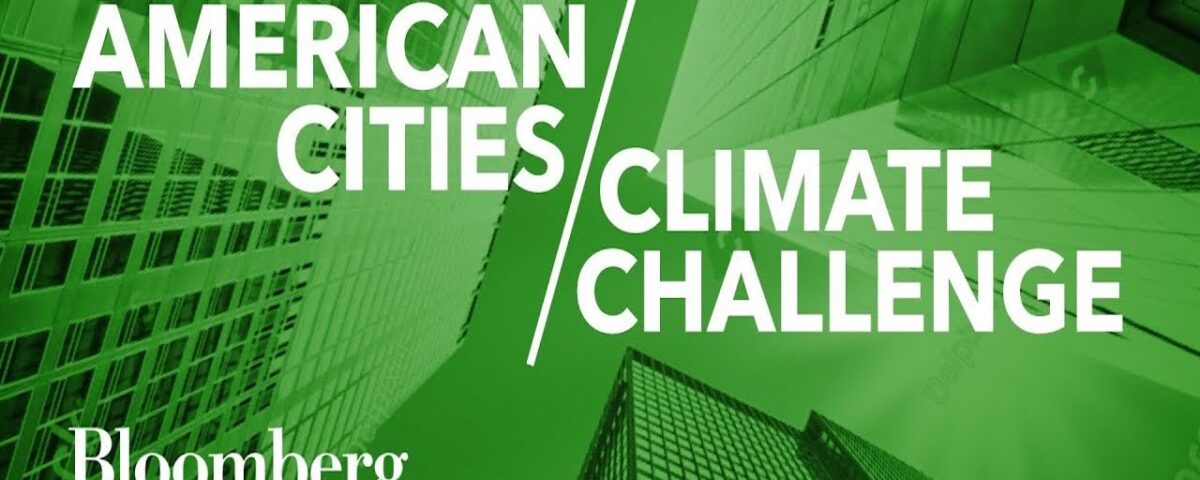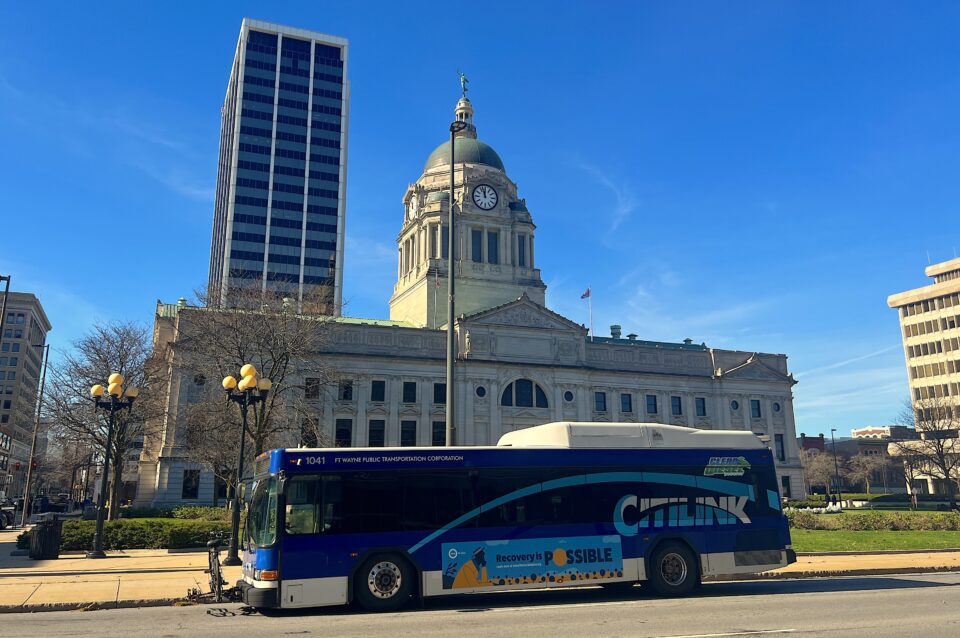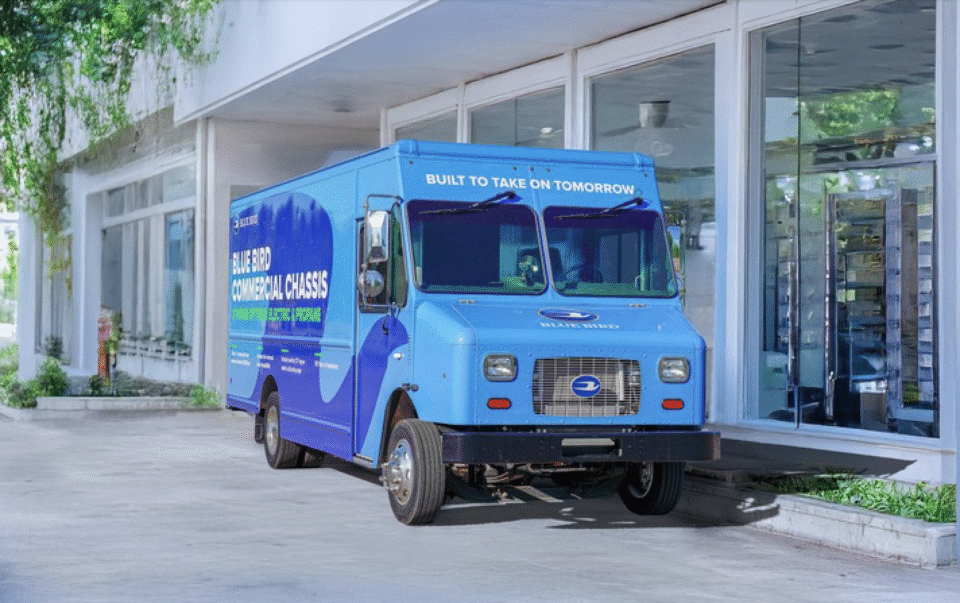Winning Cities From the Bloomberg American Cities Climate Challenge on Track to Collectively Reduce Emissions By 32 Percent and Surpass 2025 Paris Goals

25 of the Largest U.S. Cities Could Together Reduce 74 Million Metric Tons of Emissions through 2030
New Report Demonstrates Power of City Climate Leadership, Offers Roadmap and Learnings for Cities Around the World Ahead of COP26
Read the full report here
Michael R. Bloomberg, the U.N. Secretary-General’s Special Envoy for Climate Ambition and Solutions, announced today that the 25 cities who participated in the Bloomberg American Cities Climate Challenge (the Climate Challenge) are projected to reduce 74 million metric tons of carbon emissions through 2030, as documented in a new report. Additionally, due to both the Climate Challenge’s support and overall climate actions, these 25 cities are expected to collectively reduce emissions by 32 percent by 2025 – surpassing the Paris Agreement goals.
“Cities play a critical role in the fight against climate change, and this report shows just how much progress is possible when they are empowered to do more, faster,” said Michael R. Bloomberg, UN Secretary-General’s Special Envoy on Climate Ambition and Solutions, Founder of Bloomberg LP and Bloomberg Philanthropies, and 108th Mayor of New York City. “We created the American Cities Climate Challenge to provide support for bold and effective local climate strategies, and together, the cities are demonstrating that it’s possible for the U.S. not just to meet our commitments under the Paris Climate Agreement – but to exceed them.”
Launched in 2019 by Bloomberg Philanthropies, the Climate Challenge was created to provide powerful resources to 25 of the largest U.S. cities in their fight against climate change with support from world-class partners including the Natural Resources Defense Council (NRDC), Delivery Associates, RMI, Greenlink Analytics, and more. With the goal of turbocharging the impactful work already being done by mayors across the country, the Climate Challenge provided onsite technical expertise to facilitate the development of high impact policies, training for senior city leadership to assist with their implementation, and resident engagement support to maximize participation from the community.
The 25 participating cities are: Albuquerque, NM; Atlanta, GA; Austin, TX; Boston, MA; Charlotte, NC; Chicago, IL; Cincinnati, OH; Columbus, OH; Denver, CO; Honolulu, HI; Indianapolis, IN; Los Angeles, CA; Minneapolis, MN; Orlando, FL; Philadelphia, PA; Pittsburgh, PA; Portland, OR; Saint Paul, MN; San Antonio, TX; San Diego, CA; San Jose, CA; Seattle, WA; St. Louis, MO; St. Petersburg, FL and Washington, D.C.
“The innovative policies implemented by the 25 cities in the American Cities Climate Challenge exemplify the local action needed to make a global net-zero economy a reality,” said Nigel Topping, COP26 High-Level Climate Action Champion. “As we near COP26, this report proves the powerful impact cities have in helping to meet our global emissions reduction targets and the necessity for national and international leaders to continue to partner and invest in accelerating local climate efforts.”
With support from the Climate Challenge, these cities passed 54 major buildings, energy, and transportation policies and launched 71 new climate programs and initiatives – leading to the adoption of over 800MW of renewable energy, development of 510 miles of new or improved bike lanes, and deployment of over 1,100 new EVs. Additional examples of Climate Challenge-supported policies include:
- Advancing Energy-Saving Building Policies for Existing Buildings: Nearly 400 million square feet across the country are now covered by new benchmarking policies, with over 37,000 energy audits conducted.
- Transforming Streets for Public Transit: Nine cities and their public transit agencies rolled out the red carpet, painting dozens of miles of bus priority lanes to make sure public transit is a fast and convenient way of getting around. The nine cities are: Charlotte, Chicago, Denver, Honolulu, LA, Minneapolis, Philly, Portland, and Washington, DC
- Winning Funding for Better Mobility: Cities and their partners advocated for emergency relief for public transit in federal stimulus packages, resulting in $69 billion in lifeline funding to keep trains and buses running during the pandemic and into the recovery.
- Creating Better Biking and Walking: Ten cities redesigned their streets with new or improved bike lanes and sidewalks to make it easier for residents to travel without cars. The ten cities are: Atlanta, Boston, Charlotte, Denver, Honolulu, LA, Portland, Saint Paul, San Diego, and San Jose.
- Improving Renewable Energy Procurement: Nearly half of the cities procured renewable energy using tried-and-true purchasing and financing methods, helping to set a nationwide record for local government renewable energy procurement in 2020.
“Climate Challenge cities are not only demonstrating that we can take the climate action necessary to avert catastrophe–but that the solutions improve residents’ quality of life in so many ways,” said Manish Bapna, President and CEO of NRDC (Natural Resources Defense Council). “Through a unique collaboration between community groups, policy experts and ambitious mayors, these 25 cities are developing newer and better ways to get around, championing cleaner and more efficient buildings, and creating safer and healthier communities for people today. With climate at the top of the agenda in Washington and on the international stage in the weeks ahead, these cities are leading by example–and showing the world that the U.S. is still all in.”
The Climate Challenge takes a data-driven, empirical approach to evaluating policy options to meet climate goals. Using a proprietary Impact Analysis Model, specifically developed for the Climate Challenge, cities are able to easily assess the carbon reduction potential of specific climate actions and policies, including accounting for the interactions between any combination of policies. This data has helped Climate Challenge cities focus and refine their commitments using tools calibrated to their local contexts.
Beyond the impact on local communities, the majority of Climate Challenge cities have continued to raise global climate ambition ahead of COP26, while also making meaningful progress by joining the UNFCCC’s Race To Zero campaign — the largest ever alliance, including 800+ global cities, committed to achieving net zero carbon emissions by 2050 at the latest. Their progress substantiates recent research that shows the critical role cities play in curbing carbon emissions.
“The Climate Challenge’s support has enabled us to make critical strides in reducing emissions and utility bills for low-income homes, City facilities and small businesses, while bringing more electric vehicles and charging stations into our community,” said Tim Keller, Mayor of Albuquerque, NM. “Despite the immense challenges of the pandemic, we have remained committed to building a cleaner, healthier, and more sustainable Albuquerque for future generations.”
“The Bloomberg American Cities Climate Challenge has helped us pass ambitious, climate-friendly transportation policies to reduce city-wide emissions and ensure a more sustainable future for our communities,” said Keisha Lance Bottoms, Mayor of Atlanta, GA. “Cities are leading on climate action, and our learnings and progress are critical as the federal government looks to accelerate country-wide progress on climate.”
“Our recent efforts to advance the adoption of electric vehicles with a focus on equity, reducing greenhouse gas emissions, and improving air quality could not have been achieved without the support from the Climate Challenge,” said Steve Adler, Mayor of Austin, TX. “Cities and local climate leaders are integral to U.S. progress on climate – this is clearly shown in the impact report released today by the Climate Challenge.”
“Cities like Boston are at the forefront of innovative, ambitious climate policies. It is our job to ensure a sustainable and equitable future for generations to come,” said Kim Janey, Mayor of Boston, MA. “We are proud to have been selected for the Bloomberg American Cities Climate Challenge to accelerate our clean energy transition and maintain Boston’s dedication to protecting our environment.”
“With support from the Bloomberg American Cities Climate Challenge, we have launched a pilot program to electrify buses across the Charlotte area, which will lower city emissions and improve air quality for members of our community,” said Vi Lyles, Mayor of Charlotte, NC. “The Climate Challenge’s impact report clearly shows the tremendous power of city-level climate action, and we are firmly invested in doing our part for the environment.”
“With support from the Bloomberg American Cities Climate Challenge, we have taken significant steps towards accelerating an equitable and comprehensive climate plan for Chicago, with a particular focus on buildings and energy,” said Lori E. Lightfoot, Mayor of Chicago, IL. “These initiatives include a building decarbonization strategy that lowers economic burdens on residents and businesses, and the pursuit of a new contract to power municipal buildings with 100% renewable energy by 2025. Our city has shown that local leaders can move rapidly and make substantial progress on climate change—all while developing innovative strategies that scale and improve the lives of residents.”
“The Climate Challenge and its impact demonstrate that when given the right tools, cities can lead the way in fighting climate change,” said John Cranley, Mayor of Cincinnati, OH. “Thanks to this innovative program from Bloomberg Philanthropies, Cincinnati made historic progress on our commitment to providing a clean, healthy, and equitable future for our residents. We broke ground on the largest municipal solar farm in the country – a major step toward our 100% renewable energy goal and a driver of new, green jobs – and launched programs like WarmUp Cincy to assist tenants who live at or below the poverty line with energy equipment upgrades and financial help to pay energy bills.”
“The Bloomberg American Cities Climate Challenge was instrumental in Columbus passing a community-choice aggregation issue on the November 2020 ballot, which received 76 percent of the vote,” said Andrew J. Ginther, Mayor of Columbus, OH. “This issue – known as Clean Energy Columbus – is making a real difference in the lives of our residents, allowing us to move towards 100 percent clean energy and increasing the number of clean energy jobs. The resources provided by the Climate Challenge served as a true model for how local governments can implement and embed effective climate policies that will help our nation reach its climate goals.”
Michael Hancock, Mayor of Denver, CO said, “We are proud that Denver has continued to make equitable climate action a top priority for our city. This program from Bloomberg Philanthropies allowed us to not lose sight of our goals and even accelerate our progress to make transportation, buildings, and energy cleaner. Denverites are passionate about climate, passing a ballot measure last year that will raise up to $40 million per year to invest in renewable energy and other climate and resiliency projects, with at least 50 percent of the funding directed toward at-risk low-income neighborhoods and communities of color.”
“This program is helping our city reduce emissions from both buildings and transportation, while also improving quality of life,” said Rick Blangiardi, Mayor of the City and County of Honolulu, HI. “Our progress is accelerating community and market transition to solar energy and electric vehicles in new buildings, and we moved from a commitment to implementation of benchmarking our city buildings. From data to decisiveness we successfully installed the City’s first bus lane in decades on King Street, the busiest transit corridor in the state of Hawai‘i. Now we’re advancing more impactful actions by implementing our Climate Action Plan. The Bloomberg American Cities Climate Challenge is making this possible, increasing our ability to fight climate change in strategic and effective ways.”
“Cities are on the frontlines of climate change, often suffering the worst effects,” said Joe Hogsett, Mayor of Indianapolis, IN. “However, cities also possess the innovation and insight to combat climate change and must continue to be key players in this fight. Indianapolis is proud to have been selected for the Bloomberg American Cities Climate Challenge, a program that recognizes the power of cities to bring about significant change that will move our country in the right direction. This crucial partnership allowed us to institute energy benchmarking and prioritize transit-oriented communities, setting Indianapolis residents on a path to a greener future.”
“Cities stand on the frontlines of the climate emergency, and we know what solutions are needed to address it,” said Eric Garcetti, Mayor of Los Angeles, CA. “Fighting this crisis is a moral necessity, an environmental imperative, and an economic opportunity — and Los Angeles is proud to work with the Climate Challenge to lead the global movement to reverse generations of inequities, improve public health, and generate widespread prosperity across our region.
“Climate change is one of the biggest threats facing our country “said Jacob Frey, Mayor of Minneapolis, MN. “As temperatures continue to rise and extreme weather events become more frequent, we must double down on our efforts to ensure a clean energy transition and a healthy, equitable environment for all. The Climate Challenge was a vital partner to Minneapolis in helping us push forward on our climate goals to protect our communities and create a better future for our residents.”
“With the support of the Climate Challenge, Orlando was able to pass important policies that protect our communities and the environment by promoting energy efficiency,” said Buddy Dyer, Mayor of Orlando, FL. “For example, our Municipal Buildings Policy requires all new municipally-owned facilities constructed to be LEED Silver or better, while our Green Building Incentive Program expanded private sector adoption of sustainable development practices.”
“Cities are uniquely positioned to pass effective climate policies that change their communities for the better, and the Bloomberg American Cities Climate Challenge recognizes that,” said Jim Kenney, Mayor of Philadelphia, PA. “With the Climate Challenge’s support, we passed an ordinance requiring existing buildings over 50,000 sq ft to perform regular tune-ups that make buildings more efficient. This ordinance will cut carbon emissions equivalent to taking 40,000 cars off the road while creating 500 new jobs—a win-win for Philadelphia.”
“Our climate efforts have been bolstered by the powerful advocacy from the Bloomberg American Cities Climate Challenge,” said Bill Peduto, Mayor of Pittsburgh, PA. “We passed a Net-Zero Ready Requirement for all new municipal buildings, which will help reduce emissions and support energy efficiency.”
“Equitable climate action at the local level helps improve our community’s health, vitality, and economic prosperity for our city’s residents and visitors,” reflects Ted Wheeler, Mayor of Portland, Oregon. “The Bloomberg American Cities Climate Challenge helps crystalize new partnerships that support strategies like the Rose Lanes. Rose Lanes can reduce the amount of time and idling our residents spend getting around the city, making our transit system more reliable and convenient for everyone. Portland experienced extreme heat waves this past June and July, which emphasizes the reality that the climate crisis is urgent and directly impacts community members – the need to act is urgent and I am appreciative that the Climate Challenge continues to bring the conversation to the forefront.”
“As the Biden Administration accelerates our country’s climate commitments, we are proud to join communities across our nation in climate action efforts at the local level,” said Melvin Carter, Mayor of Saint Paul, MN. “With the support of the Climate Challenge, our ongoing work to launch our EV Spot Network will cut emissions and help us build an even more sustainable and resilient city for our children and grandchildren.”
“Even with the unprecedented challenges of the COVID-19 pandemic, our city has kept our focus on addressing climate change and building back better,” said Ron Nirenberg, Mayor of San Antonio, TX. “For example, with the support of the Climate Challenge, we passed the Keep SA Moving ballot measure to fund our transportation networks, making transit more accessible for our growing community while reducing emissions.”
“As a coastal city prone to extreme heat and fire risks, San Diego faces significant threats from climate change, but we also stand to reap massive benefits from bold climate action,” said Todd Gloria, Mayor of San Diego, CA. “With support from the American Cities Climate Challenge, we are implementing equitable, win-win climate policies that support historically underserved communities, protect public health and quality of life, and create good-paying jobs.”
“San José is proud to be a national leader in the fight against climate change,” said Sam Liccardo, Mayor of San José, CA. “From reducing our carbon footprint by requiring that new buildings be all-electric, to building miles of protected bike paths, we have taken action that shows just how much cities can rapidly achieve. San Jose is grateful for the support and coordinated efforts of the Bloomberg American Cities Climate Challenge as we work to reimagine our cities, and a low carbon future.”
“From winter flooding to the deadly heat wave this summer, cities like Seattle are being called upon to meet the needs of our rapidly changing climate. Bloomberg Philanthropies has been a pivotal partner in this work through the Climate Challenge,” said Jenny Durkan, Mayor of Seattle, WA. “We have advanced bold policies to reduce fossil fuel use in buildings, further environmental justice, fund public transit and promote transportation electrification – our actions are creating a more sustainable, equitable city.”
“The Bloomberg American Cities Climate Challenge provided an outstanding opportunity to advance equity as well as accelerate climate actions at the local level.” said Tishaura Jones, Mayor of St. Louis, MO. “Among others, I’m proud that, with the support of the Climate Challenge, St. Louis passed the first Building Energy Performance Standard ordinance in the Midwest, launched an innovative solar workforce development pilot, and commenced a citywide transition to vehicle electrification.”
Rick Kriseman, Mayor of St. Petersburg, FL said, “St. Petersburg is one of the most vulnerable areas to the effects of climate change in the United States. We know the time for urgent action is now. That’s why cities continue to lead the way in addressing the causes of climate change and transitioning to clean energy. We also know that it is our most vulnerable citizens and businesses who are often most impacted by extreme weather and environmental disasters. The Bloomberg American Cities Climate Challenge has provided incredible technical support and partnerships for our efforts over these past two years and enabled us to continue our leadership toward a more sustainable future.”
“We know that when it comes to climate change, cities acting together can have a powerful impact on our ability to protect the environment and shrink our collective carbon footprint,” said Muriel Bowser, Mayor of Washington, D.C. “We are on a mission in DC to become the healthiest, greenest, and most sustainable city in the world. By helping us offer more green transportation options, reduce pollution, and create clean energy jobs, the Climate Challenge is moving us closer to that goal.”
View the original article.




